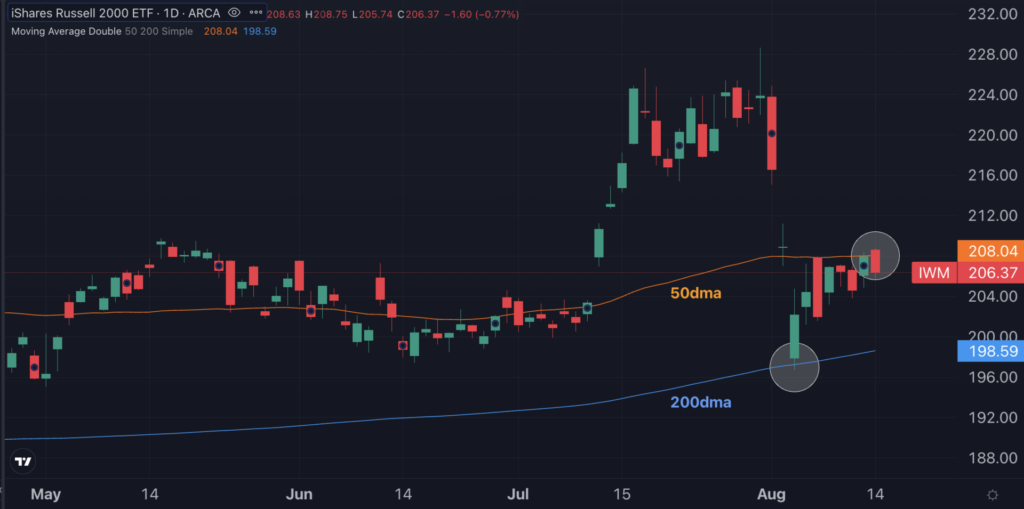Zinger Key Points
- Small caps have lagged behind large caps since early August, cooling the market rotation trend from July.
- The Russell 2000 found support at its 200-day moving average but struggles at the 50-day resistance.
- Get 5 stock picks identified before their biggest breakouts, identified by the same system that spotted Insmed, Sprouts, and Uber before their 20%+ gains.
After the early August selloff, small-cap stocks did not mirror the rally seen in large caps, effectively signaling a cooling in the market rotation trend that emerged in July.
The Russell 2000 index, which is closely tracked by the iShares Russell 2000 ETF Trust IWM, experienced a significant drop at the start of August, finding crucial support at its 200-day moving average.
However, the index has since struggled to close above the resistance of its 50-day moving average, signaling weak optimism.
On Wednesday, the Russell 2000 had an unexpected negative reaction to the cooler-than-expected July inflation data, falling by 0.7% and underperforming its large-cap counterparts.
This response contrasts sharply with the July rally in small caps, driven by a lower-than-expected June inflation report, released on July 11.
Chart: Russell 2000 Faces Bearish Pressure At The 50-Day Moving Average

Valuation Concerns: Are Small Caps Still Cheap?
Bank of America analyst Jill Carey Hall highlighted that the Russell 2000 is currently trading at a price-to-earnings ratio of 15.5x, slightly above its historical average P/E of 15.2x.
Despite this, Hall said that “small caps remain cheap versus large caps,” trading at approximately a 25% discount to their historical average (relative P/E of 0.74 vs. the historical average of 1.0x).
Michael A. Gayed, CFA, portfolio manager at Toroso Investments, also provided insights into the recent market dynamics.
“We've seen small caps within a month go from rotation beneficiary to risk-off asset,” Gayed said, emphasizing the swift change in market sentiment.
The initial rotation was sparked by a lower-than-expected U.S. inflation reading, which, coupled with positive growth outlooks, fueled equity rallies.
However, as the weak July jobs report shifted the narrative towards recession risks, the market’s risk appetite diminished, leading small caps to lag behind large caps once again.
“If small-caps keep trailing here, which is what's consistently been happening since late July, it's a stronger risk-off signal and a sign that the current rebound in equities may be a fakeout,” Gayed added.
Join Us At The Benzinga Small Cap Conference
Stay ahead of the market trends in U.S. small-cap stocks and get in-depth insights from industry experts. Join us at the Benzinga Small Cap Conference in October.
Secure your spot today by registering at Benzinga Small Cap Conference. Don’t miss this opportunity to gain valuable knowledge and network with key players in the small-cap space.
Now Read:
Image: Shutterstock
© 2025 Benzinga.com. Benzinga does not provide investment advice. All rights reserved.
Trade confidently with insights and alerts from analyst ratings, free reports and breaking news that affects the stocks you care about.